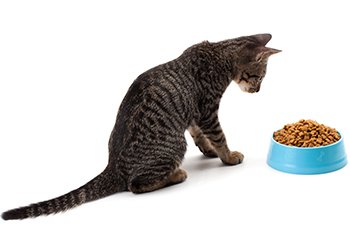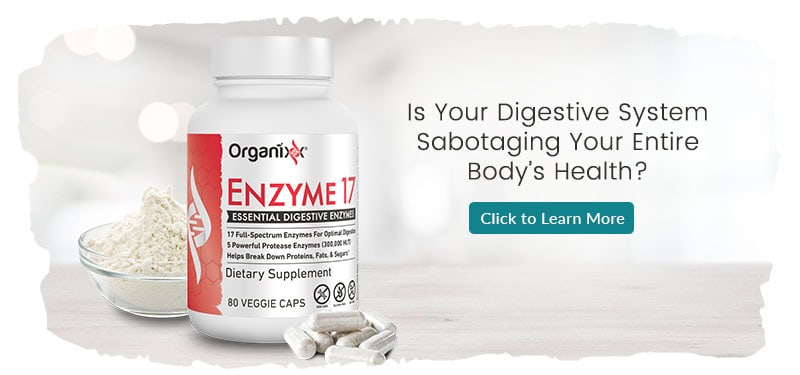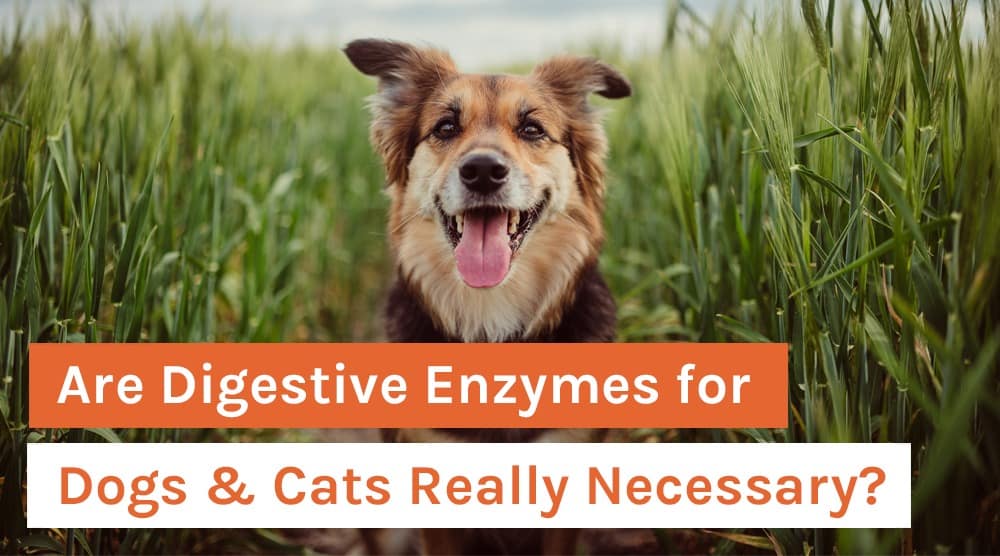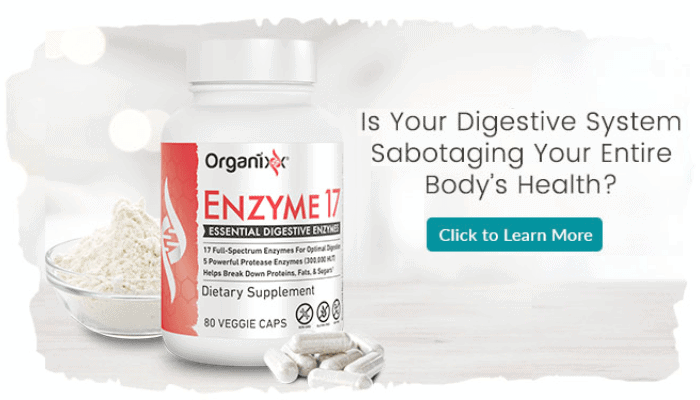Are Digestive Enzymes for Dogs & Cats Really Necessary?
In a hurry? Click here to read the Article Summary...
American pet owners collectively spend upwards of $63 billion per year pampering their furry loved ones, according to the American Pet Products Association (APPA). This includes a great many people who are happily willing to fork over top dollar in exchange for everything from fancy toys and plush bedding, to cute little outfits and top-notch grub.
This love of animals is fueling a burgeoning market for pet products that’s currently expanding at a rate of about four percent annually. [1]
Pet parents naturally want what’s best for their pets when it comes to their care and nourishment. That’s why the pet food market in particular has been seeing some impressive transformations. Pet owners are increasingly opting for more than just the standard kibble products of the past.
Depending on what you’re willing to spend, there are all sorts of premium, super premium, and even ultra premium pet foods on the market from which to choose. Each features a wide range of specialty ingredients and formulas.
All-natural and organic pet foods are one such segment that’s rapidly growing in popularity, along with the grain-free kibble craze. “Simple” is a popular buzzword that’s also garnering plenty of attention, as are dog and cat food formulas that contain only ingredients that are easy to identify and pronounce.
But despite all this, there’s still one key ingredient that’s often missing from even the most lavish dog and cat food products: digestive enzymes.
The Role of Digestive Enzymes for Dogs & Cats in Nutrient Absorption
Unless your cat or dog is eating a well-balanced, strict raw food diet, chances are they’re not getting very many (or even any!) enzymes in their food. It’s a widespread problem in the modern world and a particularly serious one. Especially because the primary function of enzymes is to convert larger foods into smaller nutrients that your pet’s body can use.
Consuming food without enzymes is a lot like putting fuel in a car that doesn’t have an engine and expecting it to run: it’s just not going to happen!
Pet food devoid of enzymes (which is any cooked or processed food) is energetically dead. Sure, it might make your pets happy for a little while and keep them alive, but don’t count on it to provide your furry friends with the strength and vitality they need to live long, healthy lives.
Besides the fact that their bodies aren’t designed to digest many of the ingredients, dogs and cats fed a steady and exclusive diet of conventional kibble often suffer eventual health problems. This grim reality hinges in large part upon the fact that these products are devoid of natural digestive enzymes.
That’s because when your pet isn’t getting enough enzymes, it’s also not getting enough nutrients. This creates a nutrient deficiency that, over time, can lead to chronic disease and death (as it does in humans). The only solution is to either change your pet’s diet or supplement it with the enzymes your pet needs to live a life full of health and vitality!
Why Digestive Enzymes for Dogs and Cats?
 When digestive enzymes are missing from food, a dog or cat’s body will draw from its internal stores until there’s nothing left.
When digestive enzymes are missing from food, a dog or cat’s body will draw from its internal stores until there’s nothing left.
No matter how premium a pet food product claims to be, the truth is that it’s really only as good as its enzyme content.
Remember, enzymes are the catalysts that turn crude food matter into energetic nutrition that a pet’s body can actually use to nourish itself. When enzymes are lacking, a pet’s body will attempt to fill this gap by producing its own – which isn’t sustainable.
While internal enzyme production in things like saliva and digestive acid is completely normal for pets, it isn’t a substitute for the enzymes found naturally in living foods.
Most kibble products, which are not living foods, undergo heavy processing before being bagged and stocked on store shelves, which means their enzyme content is next to nil. When pets eat this stuff, their bodies have to work overtime in order to compensate, wearing them out much more quickly than normal.
Having to produce extra digestive enzymes also places immense strain on systems like the small intestine and pancreas. Both are forced to draw all available resources to themselves in order to derive even minimal nutrition from the “dead” food they’re processing.
This not only taxes your dog or cat’s body to an enormous degree, but it further depletes their internal enzyme stores, which constitutes a recipe for a health disaster.
Digestion and Beyond: Enzymes Are the “Currency” of Life
When it comes to digestion, enzymes are categorized into three primary groupings [2]:
- Proteases for converting proteins into amino acids
- Lipases for converting fats into fatty acids and glycerol
- Amylases for breaking down carbohydrates into simple sugars
But there are also many other types of enzymes that perform functions beyond just food processing like those that support immune function, inflammation levels, detoxification, waste removal, hormone regulation, and aging.
Early enzyme pioneer Dr. Edward Howell discovered back in the 1930s that enzymes are so critical to the health of both humans and animals that they are probably better categorized as nutrients.
They’re really no less important than ordinary vitamins and minerals, and enzymes deserve far more appreciation than they’re currently afforded.
Dr. Howell was also among the first to observe that enzymes function as a type of life-giving currency, with the body serving as their “bank account” for long-term storage.
Similar to how one makes cash deposits at the local bank branch, consuming enzymes in high quantities will serve to store more of them up inside the body. This is critical to the life of your pet, especially as they grow older.
Similar to how it works in humans, the aging process in pets is inversely correlated with enzyme production, meaning the older little Spot gets, the less enzymes his body is able to produce. Loading him up with enzymes as early as possible will help to give him an upper hand in life – potentially lengthening his lifespan and even helping him to maintain his lively spirit well into his older years.
It’s Never Too Late to Improve Your Pet’s Diet
Don’t fret if your furry friend is already getting up there in years, as it’s never too late to start feeding more enzyme-rich foods or supplementing their diet with living enzymes. Raw honey and bee pollen, raw dairy, and fermented vegetables are some of the most powerful enzyme-rich foods out there that will make a great addition to your pet’s diet, regardless of age.
(And remember… people are animals and need enzymes too!)
Organixx Enzyme 17 contains a whopping FIVE kinds of powerful protease enzymes in combination with one of the most advanced enzyme blends on the planet. It’s scientifically designed to help your body break down and process nutrients for better absorption, digestion, and overall health.

 Sources:
Sources:
Article Summary
American pet owners collectively spend upwards of $63 billion per year pampering their furry loved ones. Much of that is spent on dog and cat food.
There’s still one key ingredient that’s often missing from pet food products (even premium ones): enzymes.
When enzymes are missing from food, a pet’s body will draw from his internal stores until there’s nothing left.
Digestive enzymes are categorized into three primary groupings:
- Protease for breaking down protein
- Lipase for breaking down fat
- Amylase for breaking down carbohydrates
Consider adding these four enzyme-rich foods to your pet’s diet or supplementing with digestive enzymes:
- Raw honey
- Bee Pollen
- Raw Dairy
- Fermented Vegetables






I add turmeric powder, ginger powder, cinnamon, and moringa powder to the kibble and allow it to soak in hot purified water for 40 minutes before serving. The vet tells me that she would judge my 12 year old chocolate lab to be seven. She says "Don't stop doing what you are doing!"
Another thing about my dog is that she's like a little goat. I harvest kale, collards, and mustard greens daily and she will eat bowls of the chopped stalks. Gotta be a lot of enzymes there!
Your dog seems to have a very healthy diet. Great job on feeding her right!
I am trying to change diet for my 5 year old lab who is so itchy he keeps me awake at night, scratches his lips till they bleed and licks his backside raw. Vet wants me to allergy test him for $700 when I see this as food allergies. Help!!! What can I do?
He could have mites. You can buy a spray to kill them.
I too am in the same predicament with my fur baby. He's up all night scratching and biting his itchy skin. I spent $150. on a food intolerance test and modified his diet but it has only been a week so I am not sure if it is working. If you find out any information...please share. I am desperate to help my baby.
Poor dog. I have some ideas that may be helpful that I used for my dog. He lived longer. I did not need a vet to help us. Contact me.
I too am interested in getting some information. I have a Shitzu Yorkie mix and he's suffered with itchy skin for years. He's now five years old and he spends hours scratching and biting his skin until it's raw. Any suggestions would be great :)
Cats can't digest Honey, that is. Left specific out. It is honey cat's aren't supposed to have.
Cats can't digest. You should make a clear distinction of something like this at the site of the first posting of information. If I'm the one who is wrong on this, please correct me. If I'm right , please correct the post about adding this for cat pets.
inn the program you mention cats have different sensativities than dogs so when you refer to dairy and bee pollen are cats ok on these? How would we know if honey might bump them into diabetes if they have a tendency?
aslo I feel there needs to be a way to be able to feed our pets healthy and raw where we don't have to spend a fortune or worry about salmonella....etc. it should be a right to have sustainable food..makes me sick to think we are slowly killing our pets as some of mine have had cancer and diabetes the whole gambit...so sad